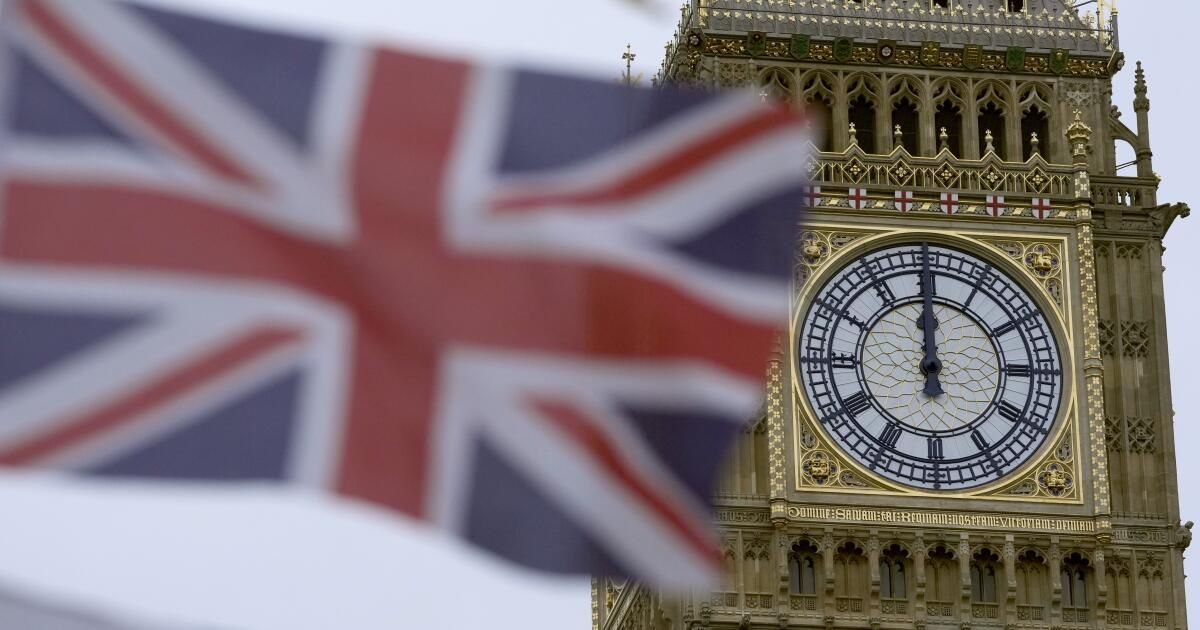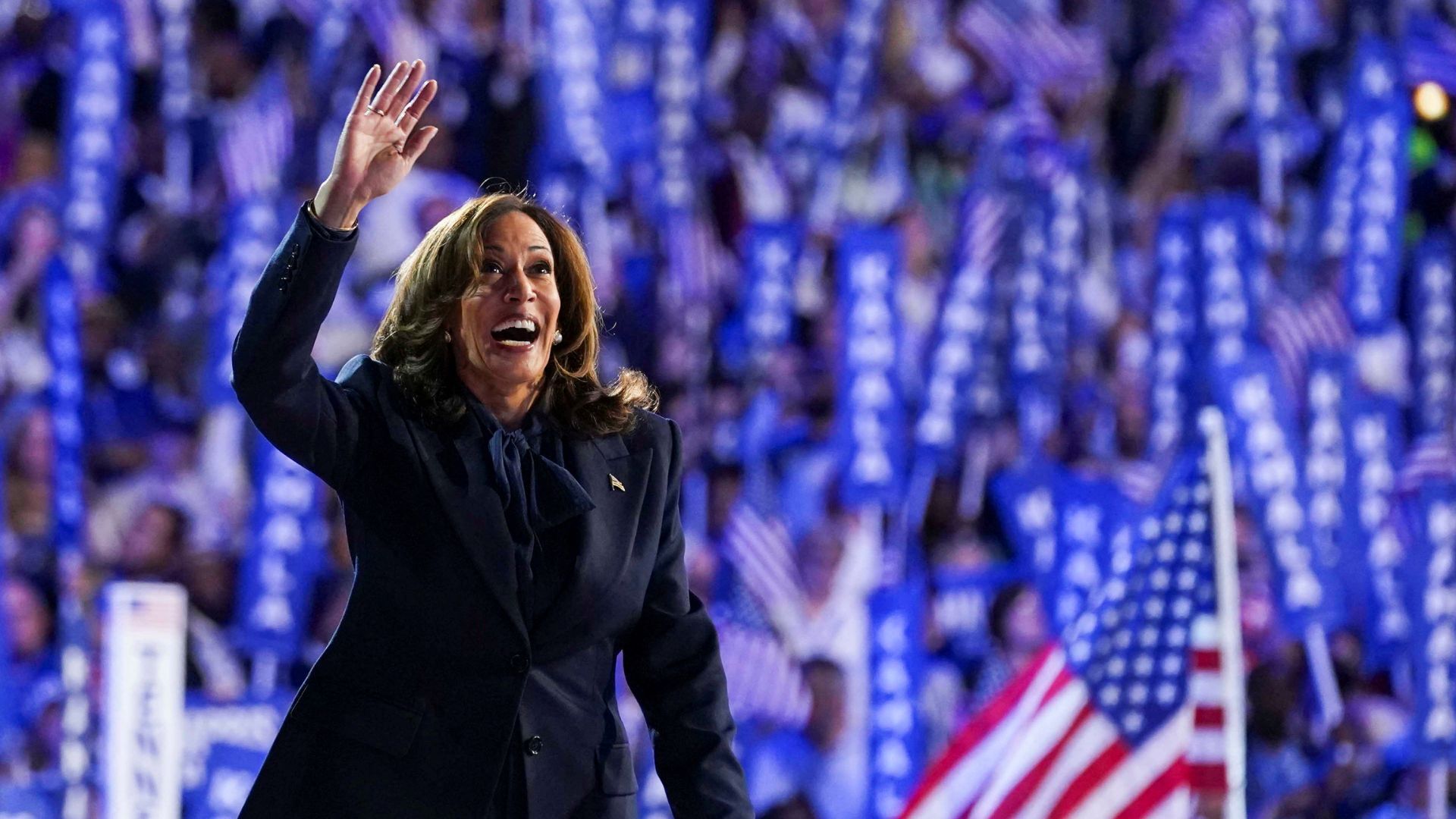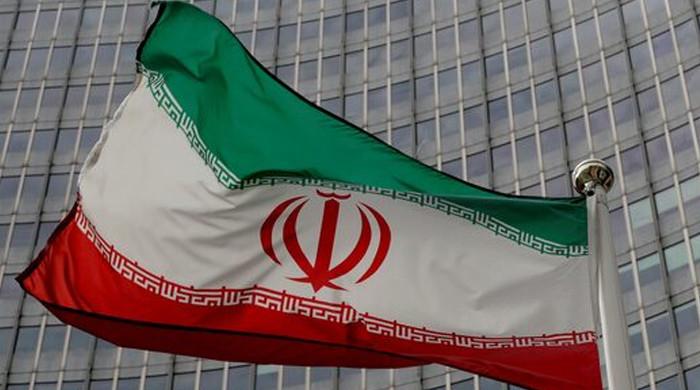British voters on Thursday appear all but certain to embrace a momentous political shift, handing the ruling Conservatives what could be a defeat of historic proportions and aligning themselves with the centre-left Labour Party.
The widely predicted result — a resounding Labour victory — would end Prime Minister Rishi Sunak’s 20-month tenure and usher in a new government led by Keir Starmer, the 61-year-old leader of the Labour Party.
What's at stake?
British parliamentary elections must be held at least once every five years. The party that wins a majority in the House of Commons (which currently has 650 seats), alone or in coalition, will form the next government. Its leader will become prime minister.
British Prime Minister and Conservative Party leader Rishi Sunak speaks at a campaign event in Leeds, England, in the run-up to the UK general election.
(Darren Stables/Associated Press)
What are the big problems?
Polls show that the main concerns of the British electorate are the cost of living, the treatment of migrants and asylum seekers and the sorry state of the National Health Service, which provides free treatment to all. There are also deep divisions over Israel's war with Hamas.
Why are elections being held now?
Because Sunak called an election. A national election was not expected until at least this autumn, and could have taken place as early as January 2025. But the prime minister apparently believed that a decline in inflation – a key concern of voters – made it an opportune time to hold an election, and he also feared that a downward trend in the party’s popularity could only accelerate. So he called it for July 4, something that had nothing to do with Independence Day in the bustling former colonies.
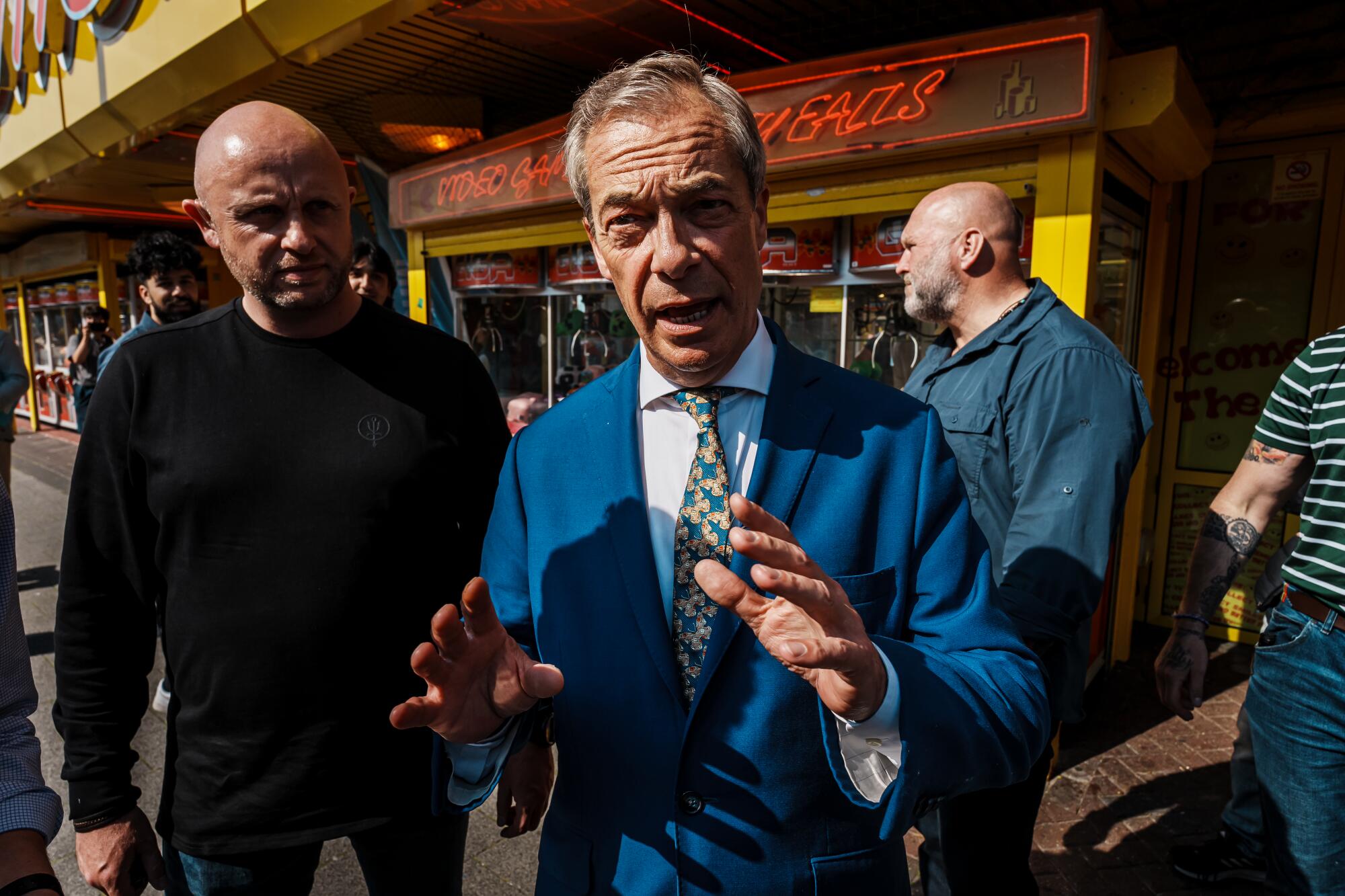
Nigel Farage, leader of the far-right Reform UK political party, speaks to reporters outside a party office above an amusement arcade in Clacton-on-Sea, England.
(Marcus Yam/Los Angeles Times)
How has that strategy worked?
The idea was that an early or “snap” election would at least leave the Conservatives in a position to serve as a solid and credible political opposition while the party worked to rebuild itself and waited for a governing Labour Party to do things that would upset people.
But the Conservatives received an unpleasant surprise relatively early in the short six-week campaign: the resurgence of political firebrand Nigel Farage and his vehemently anti-immigration Reform Party, which quickly positioned itself to snatch a large share of the Conservative vote from them.
At one point, polls put the Reform Party on the verge of equalling or even overtaking the Conservatives, but its support dipped somewhat after some of its supporters were caught openly making racist slurs.
What went wrong for the Conservatives?
Longevity, austerity and Britain’s chaotic exit from the European Union, even though politicians on both sides have avoided talking about it (a reluctance that witty commentators have dubbed “Brexit omerta”).
Analysts attribute the lack of campaign rhetoric around Brexit's widely acknowledged failure to bring prosperity and prestige to Britain to a desire by the Conservatives to avoid drawing attention to previous overpromises and Labour's desire not to antagonize potential swing voters who in 2016 had supported leaving the EU.
But after 14 years in power, the Conservatives are also battling voter discontent on other fronts. Austerity measures have undermined essential public services, especially the National Health Service, and many young Britons now see home ownership as an almost impossible dream.
Why is Labour suddenly so attractive to voters?
Labour lost heavily in 2019. However, it has since sacked its leader, Jeremy Corbyn, who was long tainted by accusations of anti-Semitism and widely disliked. The party’s reputation for economic ineptitude faded as discontent with Conservative policies and practices grew during the pandemic and after Starmer took the reins of Labour in 2020.
What about that other famous British institution?
The election comes at a difficult time for the British royal family. Both King Charles III, who ascended to the throne following the death of Queen Elizabeth II in 2022, and Catherine, Princess of Wales, separately announced this year that they were undergoing cancer treatment. And Princess Anne, the king’s younger sister, was briefly hospitalized for what was reported to be a minor head injury and a concussion.
The king has kept a limited schedule of public engagements while he undergoes chemotherapy for prostate cancer. The diagnosis and course of treatment for Catherine, the former Kate Middleton, were initially kept secret to such an extent that bizarre conspiracy theories proliferated about the nature of her illness and the status of her marriage to Prince William, the heir to the throne. The rumors died down somewhat after the princess appeared publicly in June for an elaborate ceremony called Trooping the Colour.
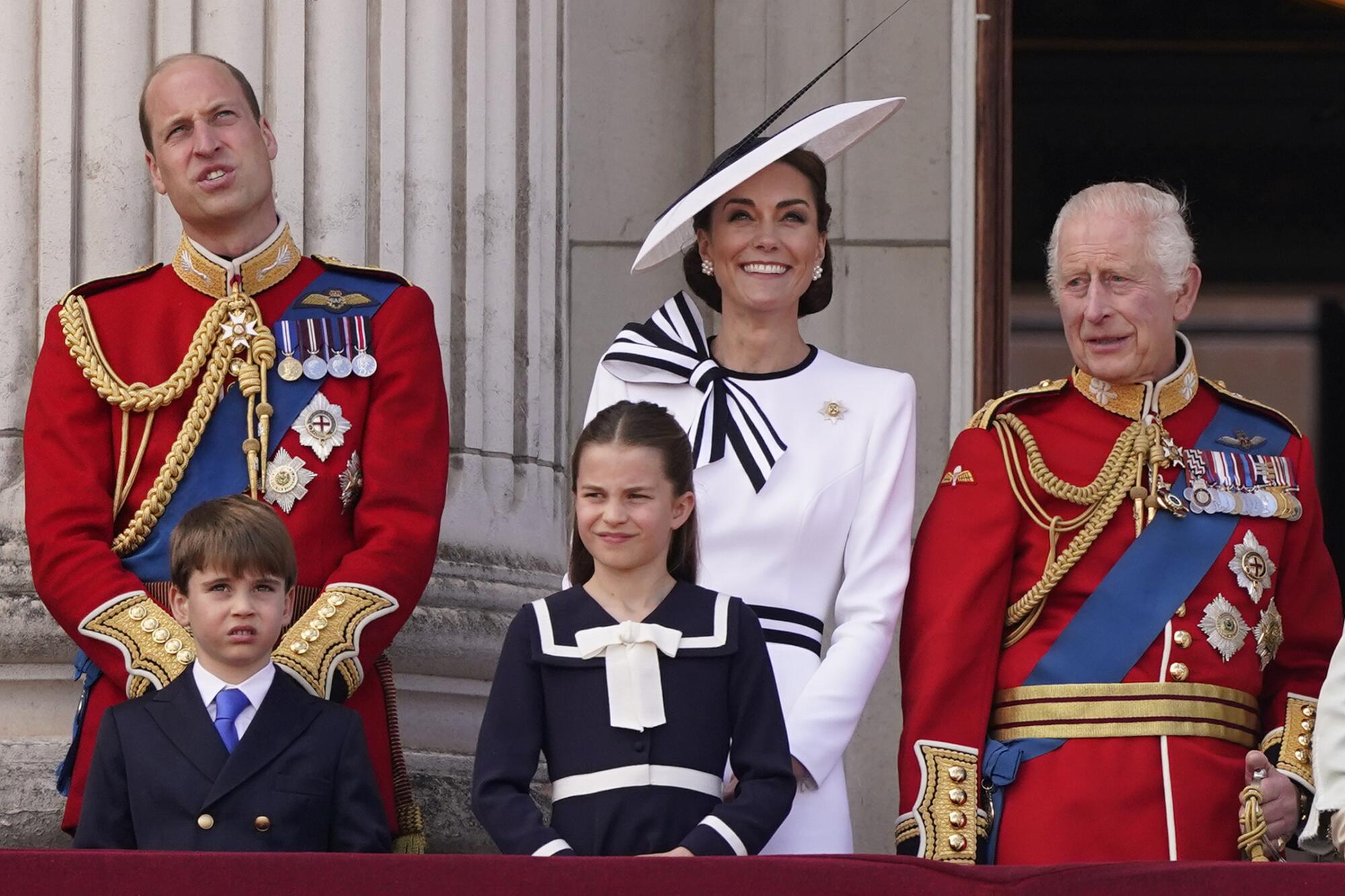
Britain's King Charles III, right, meets Prince William, Prince Louis, Princess Charlotte and Catherine, Princess of Wales, on a balcony at Buckingham Palace after the Trooping the Colour ceremony in London on June 15.
(Alberto Pezzali/Associated Press)
“The Firm,” as it is known to royal watchers, is smaller than it once was; after becoming monarch, Charles reduced the number of so-called royals who carry out engagements on his behalf.
Prince William's younger brother, Harry, and his American wife, former actress Meghan Markle, remain in California after a tumultuous split with the family in 2020. They live in Montecito with their son, Archie, and daughter, Lilibet, whose given name was the late queen's childhood nickname.
The King and Sir Keir
As any viewer of “The Crown” or those familiar with hit plays like “The Audience” know, the British monarch is supposed to stay out of politics, but she does meet regularly with the sitting prime minister. The late queen went through 15 of them, including Winston Churchill and Margaret Thatcher, and met with then-Prime Minister Liz Truss just days before the monarch’s death. Press reports have noted that Charles and Starmer (Sir Keir, following his knighthood in 2020) share a similar low-key temperament, as well as some common interests, such as fighting climate change.
The regional panorama
The British election contest, significant in its own right, coincides with tense moments in other major Western European powers, triggered in large part by continent-wide elections in June for the European Parliament. French President Emmanuel Macron faces the far-right National Rally party in a second round of snap elections on Sunday, called after his bloc’s crushing defeat by the far-right in European elections and again in Sunday’s first round. German politics was shaken by the strong showing of the far-right Alternative for Germany party in the European elections, although Chancellor Olaf Scholz did not seek to change the national electoral calendar as a result.
You're probably joking
The rotation of satirical candidates is a long-standing British political tradition, and their presence serves as a farcical parody of the pomposity, perhaps bordering on pomp, associated with such solemn occasions as a national election. Perennial joke characters such as Lord Buckethead and Count Binface (in British parlance, bins are rubbish bins) are treated with full ceremonial honours.
The prime minister, seen as in danger of losing his parliamentary seat to a Labour rival, will also be forced to share the stage on election night with a costumed count, the self-styled intergalactic warrior, who is among the parliamentary candidates in Sunak's wealthy suburban London constituency.

